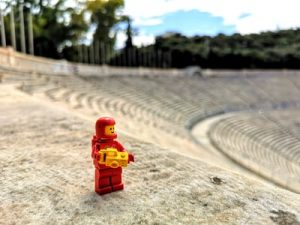After crossing the Jordan River and entering into the Promised Land, the Israelites soon saw the walled city of Jericho, a veritable fortress, imposing and impenetrable. The scene looked impossible and yet God told Joshua that they would take the city. His grand scheme: they’d march around the city for seven days with seven priests carrying seven rams’ horns. And on the seventh day when the priests blew the horns and everyone shouted, the walls would fall! (Joshua 6)
 Marching around Jericho…. Who would have considered that as a battle plan?
Marching around Jericho…. Who would have considered that as a battle plan?
Joshua and company won that first battle because they listened, trusted God’s seemingly crazy scheme, and followed through. At the city of Ai, however, they failed miserably. They failed to seek God’s counsel, overestimated their own strength, and underestimated their enemy’s.
 Today’s top military leaders collect intelligence data on which to base their strategy. Meanwhile their uniformed (yet uninformed) troops know none of that information. They only see what’s immediately around them, not the bigger picture. Left to their own judgment and without context, even the strongest soldiers could end up in chaos! Without leadership’s strategic direction, they would never win the battle and might not survive.
Today’s top military leaders collect intelligence data on which to base their strategy. Meanwhile their uniformed (yet uninformed) troops know none of that information. They only see what’s immediately around them, not the bigger picture. Left to their own judgment and without context, even the strongest soldiers could end up in chaos! Without leadership’s strategic direction, they would never win the battle and might not survive.
 What must soldiers do, therefore? They must pay attention, always listening for guidance from their commanding officers. Likewise we must stay alert for the nudging of the Holy Spirit throughout the day. God wants to lead us and guide us whether we’re exercising, showering, dressing, driving, working, eating, talking, shopping, caring for children, reading, using electronic devices, resting, or even sleeping. We never know when He’ll send some sort of direction our way.
What must soldiers do, therefore? They must pay attention, always listening for guidance from their commanding officers. Likewise we must stay alert for the nudging of the Holy Spirit throughout the day. God wants to lead us and guide us whether we’re exercising, showering, dressing, driving, working, eating, talking, shopping, caring for children, reading, using electronic devices, resting, or even sleeping. We never know when He’ll send some sort of direction our way.
The Bible and history abound with examples of divine guidance through dreams, angels, messengers, supernatural signs, and seemingly random thoughts. God really wants to get our attention!
 However, as independent creatures we’d rather figure things out on our own. We start by imagining others’ motives and intentions. Then we determine the best outcome according to our personal logic, strategizing how each person should behave, like pawns in the chess game of our minds. Finally, we have imaginary conversations with the principal players in our plot, convincing them we’re right.
However, as independent creatures we’d rather figure things out on our own. We start by imagining others’ motives and intentions. Then we determine the best outcome according to our personal logic, strategizing how each person should behave, like pawns in the chess game of our minds. Finally, we have imaginary conversations with the principal players in our plot, convincing them we’re right.
The two problems with this tactic? First, things never pan out the way we imagine in those scenarios. And second, we leave God out of the picture.
In Isaiah 55:8-9 God explains, “For my thoughts are not your thoughts, neither are your ways my ways,” declares the Lord. “As the heavens are higher than the earth, so are my ways higher than your ways and my thoughts than your thoughts.”
 In other words, we’re on the ground but He observes the entire scene, not only geographically, but also spiritually. He sees every angle as well as the beginning and the end. So while we may think we know how to solve a problem or tackle a situation, it’s always best to pray and listen to our Leader. From His vantage point He knows just what is needed and can give us the direction required to win the battle.
In other words, we’re on the ground but He observes the entire scene, not only geographically, but also spiritually. He sees every angle as well as the beginning and the end. So while we may think we know how to solve a problem or tackle a situation, it’s always best to pray and listen to our Leader. From His vantage point He knows just what is needed and can give us the direction required to win the battle.


This was GREAT, Carrie! You know I would have liked your use of Legos to make a point, right? Very insightful – and playful